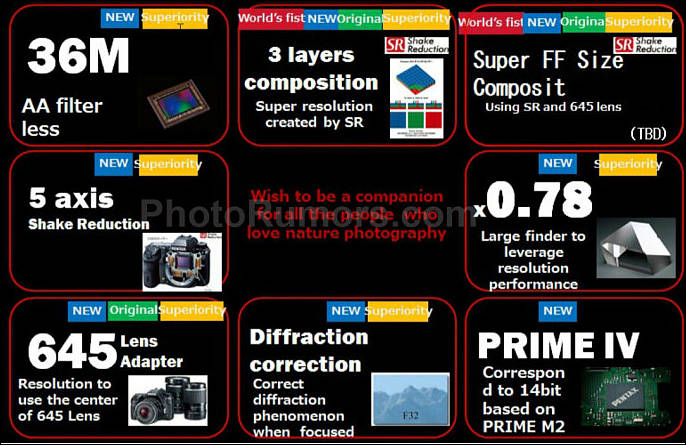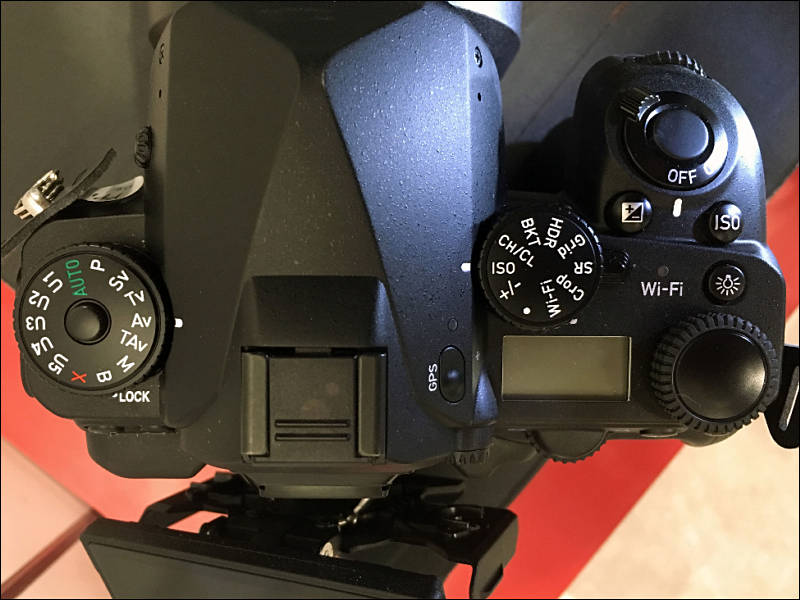
It allows to keep PV going, with more focus towards AI, but keeping be one of the few truly independent places.
-
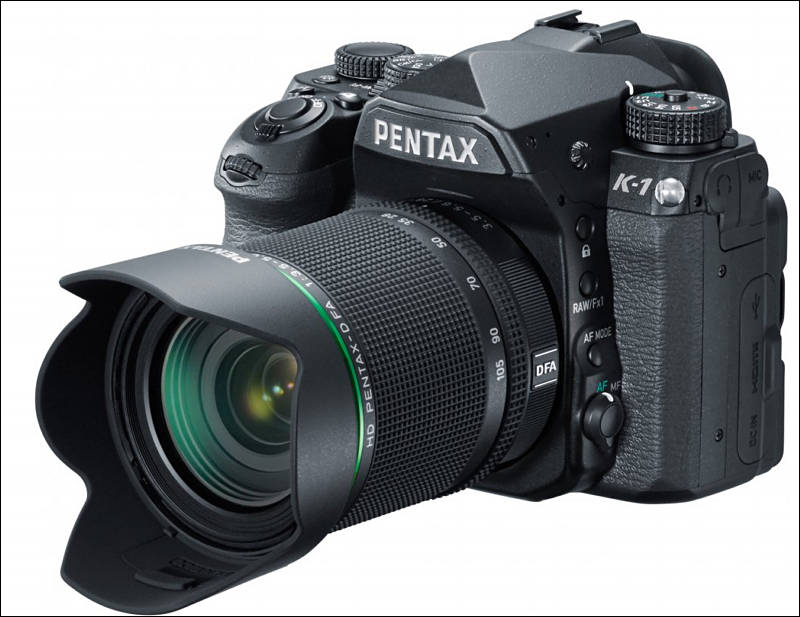
- 36.4 MP CMOS sensor
- Prime IV 14-Bit Image Processor (main issue)
- 33-AF points -3 EV, 25 cross type
- ISO sensitivity up to 204,800
- 5 axis sensor stab, 5 stop SR
- anti-aliasing filter simulation
- 300,000 actuations, 1/8000s shutter speed
- 4.4fps full-frame JPEG L (70 frames, 17 raw)
- 6.5fps APS-C JPEG L (100frames, 50 raw)
- flexible, 3.2" tilt-type monitor 1037K dots
- 0.7x 100% pentaprism VF
- Weather resistant magnesium alloy body
- Wi-Fi, GPS, compass
- Horrible 1080 interlaced 50 and 60 fps video, 30p, 25p and 24p also
- Operation assist light
- $1800 body at http://www.adorama.com/IPXK1.html
Hands-ons
- http://www.photographyblog.com/news/pentax_k_1_hands_on_photos/
- https://www.ephotozine.com/article/pentax-announce-their-first-35mm-full-frame-dslr-28880
Most probably will share the fate with his cousin K-01.
As FF DSLR for Pentax users is same as second coming for Christians I am sure something big will happen in the world this year.
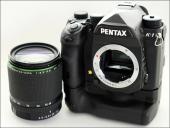
 img96.jpg800 x 602 - 59K
img96.jpg800 x 602 - 59K
 img97.jpg800 x 617 - 64K
img97.jpg800 x 617 - 64K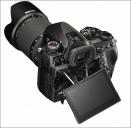
 img98.jpg800 x 784 - 73K
img98.jpg800 x 784 - 73K -
Official PR
Ricoh Imaging Americas Corporation today announced the PENTAX K-1 full-frame digital single-lens reflex (DSLR) camera. The K-1 combines the performance of a full-frame sensor with unique, user-friendly PENTAX technology and convenience features loved by professional and serious amateur photographers the world over.
The foundation of the PENTAX K-1 is its large, full-frame image sensor. This AA-filterless CMOS sensor with 36.4 effective megapixels sets the stage for ultimate creativity, facilitating super-high-resolution images rich in gradation and superb in high-sensitivity rendition.
Built around the full-frame sensor is a compact, high-performance weather-sealed and dustproof body with features only found in PENTAX cameras. “The K-1 is a blend of advanced, full-frame performance with the kind of features and advancements that PENTAX users have come to know and love,” said Jim Malcolm, president, Ricoh Imaging Americas Corporation. “As a result, the K-1 creates a solution for full-frame shooters that is unique in the industry.”
Within its compact body, the PENTAX K-1 features several advanced technologies that help the photographer to produce top results in a wide variety of challenging conditions. SR II Shake Reduction is a newly refined and highly sensitive five-axis shake-reduction system that is capable of reducing camera shake with a compensation range of up to five exposure steps, allowing photographers to freely move and compose – and to focus on their subjects, not the gear. SR II also facilitates other advanced PENTAX-unique features such as AA Filter Simulator, which effectively eliminates moiré effect without the need for an anti-aliasing filter, while increasing sharpness and overall image quality. Key to great autofocus performance on the K-1 is the new SAFOX 12 autofocus mechanism with 33 autofocus points, assuring fast and accurate autofocusing, even in the most demanding shooting situations. A newly-designed optical viewfinder equipped with the famous PENTAX Pentaprism boasts a bright, nearly 100-percent field of view.
In addition to a long list of technological advancements, the PENTAX K-1 also features a number of convenience features, making camera operation fast and easy. Designed to move in ways never before imagined is the new Flexible-tilt LCD monitor—a first for any DSLR camera. This rugged yet highly adjustable display can be positioned to the desired angle horizontally and vertically, making it easy to shoot at challenging angles. Other significant firsts include the K-1’s Operation Assist Lights – small, white LEDs that facilitate camera operation in low-light environments, making it easy to change lenses, swap memory cards and adjust back-of-camera controls, and a Smart Function dial that allows photographers to easy select frequently-used functions without going into the LCD menu.
Current PENTAX lens owners will appreciate that they can incorporate their APS-C lens collection into their new PENTAX K-1 full-frame camera kit by utilizing the K-1’s Crop Mode, which offers settings in-camera for either APS-C or Full-Frame sized shooting, regardless of the attached lens. There is also an “auto” mode that detects the lens type and sets the camera accordingly.
Upon launch, PENTAX is offering 12 full-frame compatible lenses, including two new models being announced concurrent with the K-1 camera: the HD PENTAX-D FA 15-30mm f.2.8 ultra-wide angle zoom lens and the HD PENTAX-D FA 28-105mm f/3.5-5.6 compact, lightweight zoom lens. (Note: separate news releases have been issued today to provide details on each lens).
Pricing and Availability
The PENTAX K-1 camera will be available April 2016 at www.ricohimaging.com and retail outlets nationwide for a manufacturer’s suggested retail price of $1,799.95.
-
High-resolution, fine-gradation images supported by approximately 36.4 effective megapixels
The K-1 features an AA (anti-aliasing) filterless design that prioritizes image resolution, as well as the new PRIME IV imaging engine, which is capable of 14-bit RAW-format image recording. The K-1’s unique full frame sensor and imaging engine design also allows for super-high-sensitivity shooting up to ISO 204800, producing beautiful, high-resolution images.
New-generation SR II five-axis system
- In-body SR II mechanism assures optimal shake reduction performance
The SR II (Shake Reduction II) five-axis mechanism enables accurate control of the large full-frame image sensor with all compatible PENTAX interchangeable lenses.* In addition to camera shake caused by pitch and yaw, it effectively compensates for camera shake caused by horizontal and vertical shift, as well as camera shake caused by roll, which is difficult to deal with by lens-installed shake reduction mechanisms. Even when taking a panning shot, this system automatically detects the direction of the camera’s movement, and efficiently controls the SR II unit to always produce the best image possible. - Pixel Shift Resolution System with a new motion correction function
This system uses the latest super-resolution technology, which captures four images of the same scene by shifting the image sensor by a single pixel for each image, then synthesizes them into a single composite image. Compared to the conventional Bayer system, in which each pixel has only a single color data unit, this innovative system obtains all color data within each pixel. It incorporates a new motion correction function, which automatically detects a moving object during continuous shooting. - Innovative AA filter simulator to minimize moiré
By applying microscopic vibrations to the image sensor, the K-1's AA (anti-aliasing) filter simulator provides the same level of moiré reduction as an optical AA filter. - Supportive shooting functions
Since the K-1’s SR II unit has a flexible design that tilts the image sensor unit in all directions, it provides a host of handy shooting functions, including auto level compensation, image-composition fine-adjustment, and AstroTracer, which simplifies advanced astronomical photography using a built-in GPS module.
Flexible tilt-type LCD monitor to accommodate various shooting angles
The K-1 features a newly designed, Flexible-tilt LCD monitor, which tilts horizontally, vertically or diagonally with a single action, without deviating from the lens’s optical axis. 35 degrees of horizontal and 44 degrees of vertical adjustment can be achieved; the LCD panel can even be laid flat up or down. The 3.2-inch LCD monitor features a tempered-glass front panel for added durability, a unique air-gapless construction effectively reduces reflection, and a new Outdoor View Setting mode allows the user to instantly choose the desired monitor brightness level.
Newly developed SAFOX 12 with 33 sensor points and full-frame-proportioned AF frame
The SAFOX 12 AF sensor module features 33 AF sensors (25 cross-type sensors positioned in the middle). The center sensor and the two sensors located just above and below it are designed to detect the light flux of an F2.8 lens, making it easy to obtain pinpoint focus on a subject when using a large-aperture lens.
**Upgraded PENTAX Real-Time Scene Analysis System, with application of artificial intelligence technology **
The K-1’s advanced PENTAX Real-Time Scene Analysis System performs near-instant analysis of exposure, color, movement and other factors. Combined with a breakthrough artificial intelligence technology called deep learning, the K-1 instantly optimizes settings for even the most difficult shooting situations.
Easy-to-focus optical viewfinder with nearly 100-percent field of view
Newly developed for its 35mm full-frame design, the K-1’s optical viewfinder provides a nearly 100-percent field of view and an approximately 0.7-times magnification. A Natural Bright Matt III focusing screen allows ease of focusing and a true-to-life rendition of defocused areas in the viewfinder image.
High-speed continuous shooting with a top speed of approximately 4.4 images per second
The K-1 has a larger shutter unit that easily accommodates the camera’s full-frame image sensor and provides high-speed, high-accuracy control of the mirror unit. A high-speed data transmission system incorporated in the PRIME IV imaging engine allows the user to continuously record as many as 17 images in the RAW format (or a maximum of 70 images in the JPEG Best format) in a single sequence, at a top speed of approximately 4.4 images per second.
Supportive shooting functions to improve picture-taking efficiency and operational comfort
- Operation assist light function, which provides LED lights above the lens mount, behind the LCD monitor, at the memory car slot, and at the cable switch terminal to facilitate fast and easy operation in poorly lit settings.
- Key lock function, which prevents erroneous operation of the four-way controller and other exposure-related control buttons.
- Smart function, which allows the user to swiftly choose and set desired functions using just the function dial and the set dial on the camera’s upper panel, without referring to the menu screen on the LCD monitor.
- Control panel customize function allows the user to change aspects of the on-screen menu.
Compact, solid body with dustproof, weather-resistant construction
Constructed of sturdy yet lightweight magnesium alloy with the inclusion of 87 sealing parts in the body, the K-1 also boasts a dustproof, weather-resistant and cold-resistant construction.
Other Features
- Wi-Fi operation allowing camera control and image transfer to tablet or smartphone via the free ImageSync app
- Full HD movie recording at 1920 x 1080 pixels in the H.264 recording format
- Built-in GPS module and electronic compass
- High-grade DR II (Dust Removal II) mechanism for effective elimination of dust on the image sensor using ultrasonic vibration
- Crop mode with a choice of image area from AUTO, FF (Full Frame) and APS-C, to accommodate different types of lenses
- Clarity control and Skin Tone correction functions, a pair of the latest image processing technologies developed by RICOH Central Laboratory
- HDR (High Dynamic Range) shooting mode with RAW-format data filing, usable in handheld shooting
- The PENTAX-invented hyper operating system for quick, accurate response to the photographer's creative intentions
- Dual SD card slots for memory card flexibility (compatible with SDXC UHS-1 speed class in SDR104 buss speed mode)
- Compensation of various parameters: lens distortion, lateral chromatic aberration, diffraction, and brightness level at image-field edges. Fringe effect compensation is also available in RAW-format processing.
- Compatibility with PENTAX Image Transmitter 2 tethering software (Software update required from RICOH IMAGING official website)
- Digital Camera Utility 5 software (latest version) included
looks like they're inspired by the 67
- In-body SR II mechanism assures optimal shake reduction performance
-
Very ugly, but a great mark, I like Pentax.
-
I'm guessing the 70-200 they just announced will be for this camera.
-
The next big news; Panasonic is gonna be making a camera with an APC sensor.
-
The next big news; Panasonic is gonna be making a camera with an APC sensor.
You have very limited imagination :-) It'll be FF sensor with special 4 mounts adapter, so you could buy 4 m43 lenses and have full FF coverage.
-
You have very limited imagination :-) It'll be FF sensor with special 4 mounts adapter, so you could buy 4 m43 lenses and have full FF coverage.
Even much better than I imagine lol
-
maybe pany will pull a sony and their m43 mount covers aps ?
-
my very first camera was a Pentax and I loved it, always had a soft spot for the brand. This is good news.
-
F*$% yes! Please let it also have a 4K recording I can work with.
-
So is Pentax gonna have to develop new lenses to cover the new full frame sensor?
-
So is Pentax gonna have to develop new lenses to cover the new full frame sensor?
Many of their existing lenses are FF :-)
-
OK, I didn't know that. Any particular reason they made some of their lenses FF when their cameras are APC sensor? Or were they just planning to get to FF at some point? I have always loved Pentax images quality.
-
Any particular reason they made some of their lenses FF when their cameras are APC sensor? Or were they just planning to get to FF at some point? I have always loved Pentax images quality.
Many lenses design comes from film era, and many are still using screw drive for focusing :-)
-
After many previous rumours suggesting Pentax was going to be releasing a 'full frame' DSLR I won't be losing any sleep. I'm quite happy with my K3. I've always liked Pentax lenses and use them on my GH2. I guess if we do see a full frame Pentax I may be tempted as I have so much older Pentax full frame glass including all three FA Limiteds so it might be interesting to use them on a full frame sensor camera.
-
I trust Pentax, my K5s are workhorses and lenses do very well, especially the limited edion series. They plan on adapting those few Aps-c K mount lenses on the new FF. Another plus should be in-body stabilization
-
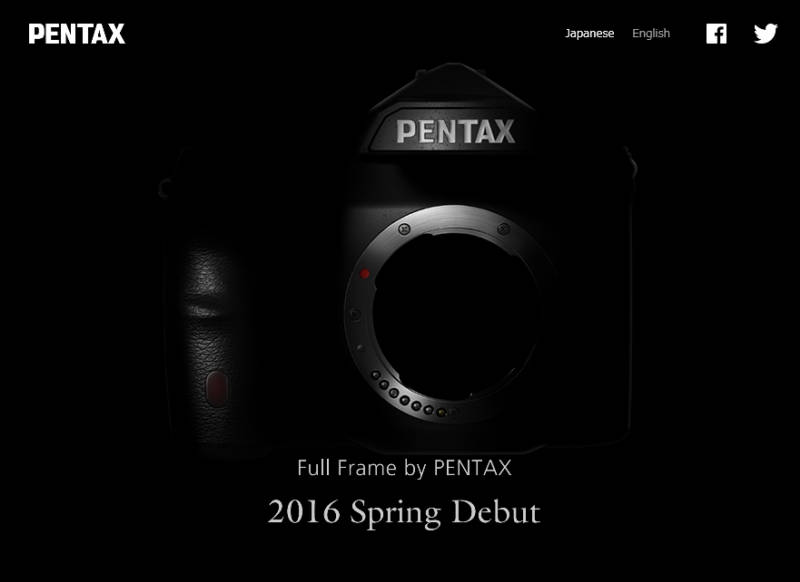
Spring 2016 is now shows as release time

 mitakon7.jpg800 x 582 - 25K
mitakon7.jpg800 x 582 - 25K -
I thought they had a nicely set up marketing beforehand, of great APS-C cameras and affordable medium format cameras. Wish instead of introducing FF, they'd instead pushed higher end APS-C (like the Samsung NX1) and driven down medium format prices even lower. Thus attacking FF from both sides! Rather than joining them.
-
Marketing and Pentax? Well, this things do not match.
-
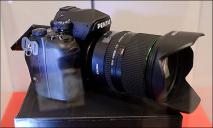
 zebra213.jpg602 x 362 - 37K
zebra213.jpg602 x 362 - 37K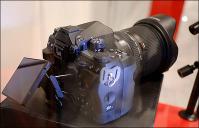
 zebra214.jpg597 x 384 - 39K
zebra214.jpg597 x 384 - 39K -
Seems really big , did they forget they had the pentax MX and then the MZ.... ? Btw now they go FF , you can expect a FF GRD soon, why buy a leica Q :p.
-
It is Pentax. Big, clunky and sealed. Good to kill someone.
-
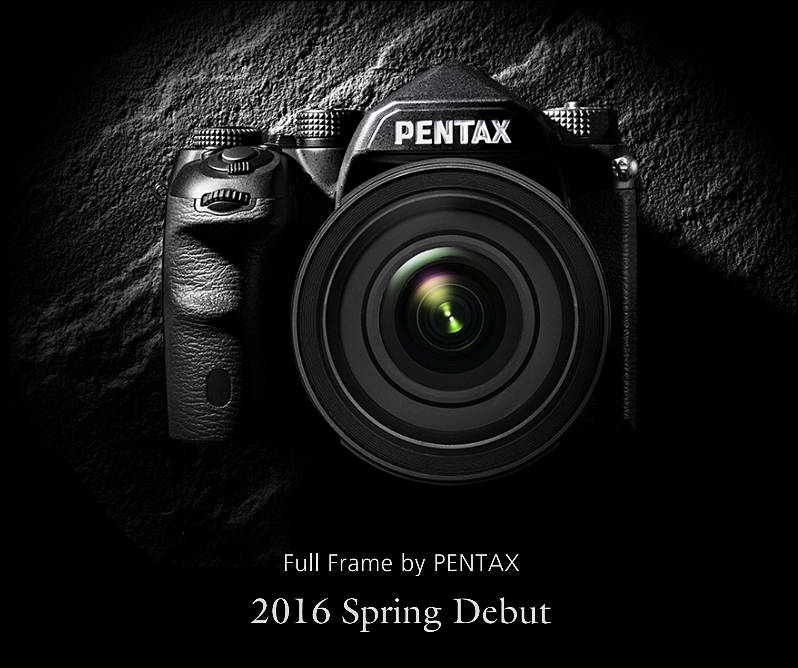
PENTAX has always been a unique brand of camera. Never one to imitate other makes, PENTAX has stuck to its pursuit of original value to create high-performance cameras used and loved by pros and amateur photographers alike.
Let’s look back on the history of PENTAX, going back to its origins at Asahi Optical Co., Ltd. The company was established in 1919 as Asahi Kogaku Goshi Kaisha. It manufactured eyeglass lenses and cine lenses. In 1952, the company began camera production with its Asahiflex 1, the first single-lens reflex camera made in Japan. In 1954, this model evolved into Asahiflex IIB with a quick-return mirror. The Asahi Pentax AP, which came out in 1957, was the first camera to come equipped with a pentaprism—a five-side optical glass element—as well as a quick-return mirror. This was the first time the name PENTAX appeared. These models were followed by many other cameras—exclusively SRL [sic] —equipped with unique features that were the first of their kind, both in Japan and in the world. In 1964, the Asahi Pentax SP was the first SRL [sic] with TTL (through-the-lens) metering. Asahi Pentax ES, launched in 1971, was the first with TTL full-aperture metering and automatic exposure control.
Not all PENTAX cameras used 35 mm film. In 1967, the maker put out the first medium-format SRL [sic] with built-in TTL exposure metering that used 6 cm x 7 cm film. The camera was aptly named PENTAX 6 x 7. A medium-format camera using 6 cm x 4.5 cm film, the PENTAX 645 (1984). Not only did PENTAX mobilize the medium-size camera world with 35 mm cameras, but it also launched the first medium-format interchangeable AF lens camera, PENTAX 645NII (1997), achieving both high-quality pictures and mobility. The camera has been used and loved by photography lovers of all kinds.
As for digital SRL [sic] cameras, in 2003, PENTAX *istD was unveiled as the smallest and lightest weight camera in the world. PENTAX K100D (2006) was well-received as the first PENTAX digital SRL to have built-in image stabilization. The same year, PENTAX K10D was released. It had the same functions as K100D as well as the first dustproof and weatherproof structure, and achieving a reputation for overall excellence in an SLR camera. It received 3 major international camera awards: TIPA, Camera of the Year, and EISA. In the years that have followed, the maker has continued to release unique cameras, such as the digital SRL [sic] with the well-known medium-format 645 mount, PENTAX 645D.
Coming up in spring 2016!

 zebra449.jpg798 x 668 - 72K
zebra449.jpg798 x 668 - 72K
Howdy, Stranger!
It looks like you're new here. If you want to get involved, click one of these buttons!
Categories
- Topics List23,992
- Blog5,725
- General and News1,354
- Hacks and Patches1,153
- ↳ Top Settings33
- ↳ Beginners256
- ↳ Archives402
- ↳ Hacks News and Development56
- Cameras2,367
- ↳ Panasonic995
- ↳ Canon118
- ↳ Sony156
- ↳ Nikon96
- ↳ Pentax and Samsung70
- ↳ Olympus and Fujifilm101
- ↳ Compacts and Camcorders300
- ↳ Smartphones for video97
- ↳ Pro Video Cameras191
- ↳ BlackMagic and other raw cameras116
- Skill1,960
- ↳ Business and distribution66
- ↳ Preparation, scripts and legal38
- ↳ Art149
- ↳ Import, Convert, Exporting291
- ↳ Editors191
- ↳ Effects and stunts115
- ↳ Color grading197
- ↳ Sound and Music280
- ↳ Lighting96
- ↳ Software and storage tips266
- Gear5,420
- ↳ Filters, Adapters, Matte boxes344
- ↳ Lenses1,582
- ↳ Follow focus and gears93
- ↳ Sound499
- ↳ Lighting gear314
- ↳ Camera movement230
- ↳ Gimbals and copters302
- ↳ Rigs and related stuff273
- ↳ Power solutions83
- ↳ Monitors and viewfinders340
- ↳ Tripods and fluid heads139
- ↳ Storage286
- ↳ Computers and studio gear560
- ↳ VR and 3D248
- Showcase1,859
- Marketplace2,834
- Offtopic1,320
Tags in Topic
- pentax 48



